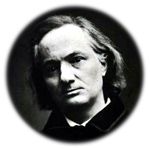
Charles Baudelaire,
flâneur originale
A flâneur, according to Webster, is “an idle man-about-town”. It’s pretty evident that a man who was compelled to log words and definitions day and night knew little about the art of flânerie (flâneury), French for strolling. For the flâneur is not merely a loafer gadding his short life away.
He or she is a creature so enthralled by the world that the internal yields to the external, so fascinated with the other that the self is temporarily forgotten. The flâneur is misunderstood by the non-flâneur who fails to recognize the endeavor in his art. For the flâneur is indeed striving toward a goal, making a concerted effort to become anonymous in the crowd — an undetected voyeur — and to sate a philosophical, an aesthetic and an almost spiritual fascination with the scene around him/herself.
“For the perfect flâneur, it is an immense joy to set up house in the heart of the multitude, amid the ebb and flow. To be away from home, yet to feel oneself everywhere at home; to see the world, to be at the center of the world, yet to remain hidden from the world—such are a few of the slightest pleasures of those independent, passionate, impartial natures which the tongue can but clumsily define.” ~ Charles Baudelaire
The flâneur seeks communion with the other, and this requires a receptivity and a yielding to the bustle of the urban crowd.
“[Flâneurs] are opening their eyes and ears to the scene around them. They are not treating the street as an obstacle course to be negotiated; they are opening themselves up to it. They are wondering about the lives of those they pass, constructing narratives for them, they are eavesdropping on conversations, they are studying how people dress and what new shops and products there are (not in order to buy anything—just in order to reflect on them as important pieces of evidence of what human beings are about)… While cities bring together huge numbers of people, paradoxically they also separate them from each other. The goal of flâneur[s] is to recover a sense of community… To do this, they let down their guard, they empathize with situation they see. There’s a constant risk they will be moved, saddened, excited – and fall in love.” ~ Alain de Botton
“Flâneurs don’t have any practical goals in mind, aren’t walking to get something, or to go somewhere. What flâneurs are doing is looking. Opening their eyes and ears to the scene around them, wondering about the lives of those they pass, constructing narratives about the houses, eavesdropping on conversations, studying how people dress and street life in general. Flâneurs relish what they discern and discover.” ~ Alan Fletcher (The Art of Looking Sideways
)
“Flânerie… is immersion in an anonymous, spectatorial gaze that gives license to wandering and observing… It is an aesthetic action, art form, and social phenomenon… The flâneur… possesses a way of seeing the world and being in the world that intrinsically reveals meaningful, social commentary.” Blackwell Encyclopedia of Sociology
“The deepest problems of modern life derive from the claim of the individual to preserve the autonomy and individuality of his existence in the face of overwhelming social forces, of historical heritage, of external culture, and of the technique of life…” ~ Georg Simmel (The Metropolis and Mental Life)
Sometimes it’s best to step aside and let others swing at the piñata. Though none of the definitions/ruminations above precisely encapsulate my personal brand of flânerie, taken together they come close.
“I quote others only the better to express myself.” ~ Michel de Montaigne
My own flâneur précis remains a work in progress, but for now you’re welcome to meander through my piñata swings: virtualDavis: a Flâneur in the Digital Age.
Updates for What is a Flâneur?
The earliest version of this page was coded into existence with clumsy, labored HTML around January 2000. It has dilated and contracted over the years like a stubborn accordion. From time to time I stuff in another tune, then — a month or a year later — I manage to pull it out again, usually adapting it into a standalone blog post (most can be found in the Flâneur category). What remains are a few of the most helpful sources I have found. If you’re looking for a source that has vanished from this page, try using the search function and you can most likely find what you want in a blog post. If not, contact me and I’ll try to help you out.
Related articles
- Mindfulness and Flânerie (virtualdavis.wordpress.com)
- Joy walking (psychologytoday.com)
- Ascent of the Cyberflâneur (virtualdavis.com)
- Les Fleurs du Mal, Charles Baudelaire
- Kiyoshi Yamashita




[…] the benefits of the art of walking. I present for you my Uncle Philly. My Uncle Philly was a Dublin flaneur. A man who not only experienced and absorbed the street scape but contributed to it and became part […]
[…] to have an early post (12+ years is practically ancient in cyberlandia!) about flanerie (“What is a Flâneur?“) resurface in the blogosphere courtesy of The Concerned Canadian. In “The Art of […]